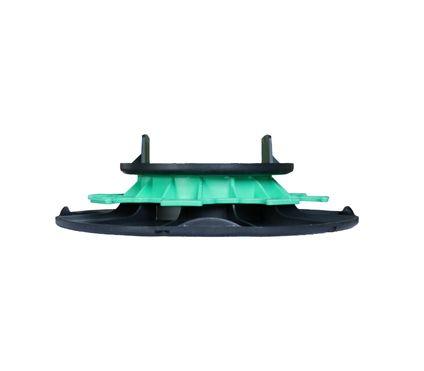
Decking Cover Tape

2 fixing tabs for fixing the joist securely in place on the riser pedestal.
Reinforced for greater compressive strength.
New flange shape: optimises riser pedestal fitment against a wall or internal corner.
81 cm between tabs.

Single ergonomically designed screw adjuster. 8 integral lugs for convenient millimetre-accurate manual adjustment.
Height adjustable for the construction of natural timber and composite decking for pedestrian use. By removing the need for arduous earthmoving and concrete, it makes the whole process of terrace and patio construction easier. The riser pedestal head has two integral tabs to which the joist is screwed. The manual screw adjuster enables precise height adjustment.
For projects involving the installation of hot tubs on rise pedestals please, contact your joist supplier.
You can also use our PROFILDECK solution (instructions are downloadable from the “pro documentation” tab).
Facilitates construction of timber and composite decking. Terrace for pedestrian use only. For outdoor use only. Composite joists should not be used.
When the riser pedestal is used at the maximum end of its adjustment range, we recommend adding a 10 mm extender for greater flexibility of adjustment.
When the riser pedestal is used at the minimum end of its adjustment range, we recommend using the next size down and adding a 10 mm extender for greater flexibility of adjustment.
All riser pedestals must be installed on stabilised ground or a precast concrete slab. All riser pedestals for paving must be installed on stabilised ground or a precast concrete slab. Where necessary, please refer to our installation advice.
Before you start work on building your decking, it is important to check that you have the necessary permissions or authorisations. In practical terms, if you are a homeowner, and depending on the size of your project, you may need a notice of intended building alterations or a construction permit. For more information, our advice is to contact your local planning department directly. Are you member of a joint ownership scheme? Don’t forget to ask your property management company for permission.
European timbers, including many softwoods, have the advantage of being generally more affordable than more exotic timbers.
So it is clear that each species of timber has its own advantages and disadvantages. The best thing to do is speak to your supplier, who will be able to guide you towards the best choice on the basis of your visual, ecological and other preferences.
We generally recommend a distance of 70 cm between adjustable riser pedestals, although this may vary depending on joist cross-section and type of timber used. In terms of joists, we recommend centre-to-centre spacing of 50 cm when using natural timber decking boards. Please be aware that different rules apply for composite decking.

of existence at your service
to bad weather
and environmentally friendly
thanks to our innovative systems
Jouplast® guides you in your outdoor development project (terrace, staircase, driveway) by establishing a complete shopping list in 5 minutes.
Also benefit from expert advice to install your project with complete peace of mind.
You will find here all our directions for use.
Find the point of sale closest to you using our dealer map. We remind you that no products are sold directly. Please contact one of our distributors if you wish to receive a quote or make a purchase.
Our products are installed by numerous landscapers or public works companies. We encourage you to contact one of these professionals for the installation of Jouplast® products.
If you need assistance or information, you can reach out to your distributor.
Thank you!
To find the price of your Jouplast® product, we invite you to contact your nearest distributor.
We do not sell directly to individuals or professionals.
To find a price, we recommend contacting your usual distributor.
If your product is defective, we invite you to contact your distributor.
If the response from your distributor is not satisfactory, please feel free to write to us using the contact form.
In the case of receiving slightly deformed or warped pads, we assure you that they remain suitable for installation. Once the covering is installed, the pad will return to its original shape.